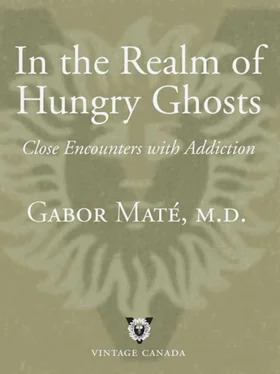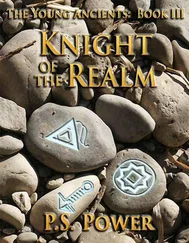“That’s not the point. I’m talking about telling your family the truth about how you feel and what you’re up to. You just don’t want to face the hassle of being clear with them. You’re afraid of their judgment or of your own. You’re too chicken to be honest.”
Sean throws me a direct glance, an abashed smile on his face. “That’s how it is, Doc.”
“Well, then, get off it. Be open about what you want and what you don’t want. That much you do owe your family.”
“Doc,” having pushed his addicted patient to tell the truth, will now go home and deceive his wife, his briefcase stuffed with the latest haul of Sikora’s loot.
CHAPTER 10

Twelve-Step Journal: April 5, 2006
Tonight I will attend my first Twelve-Step group. I’m apprehensive. Do I belong there? What will I say? “Hi, I’m Gabor and I am a…” A what? An addict…or a voyeur?
I’ve never been hooked on substances. I’ve never tried cocaine or opiates, partly due to the fear that I’d like them too well. I’ve been drunk exactly twice in my life, during my college years. Both incidents ended with bouts of vomiting—the first time in the vehicle of Lieutenant Jeunesse, my company commander at the Canadian Officers Training Corps summer boot camp at Borden, Ontario. He was driving me and several comrades back to the barracks after an evening of carousing at the Officers’ Club. “You made a mess of my car last night,” the lieutenant shouted at me on the parade square early next morning. “Sorry, sir,” I groaned by way of reply, drawing myself to full attention. “I wasn’t thinking.”
I expect to meet people at AA who, by and large, have had their lives devastated by alcohol or other drugs. For months or years at a time, their minds and bodies have been tortured by the craving for substances. They’ve been racked by withdrawal pangs, their throats parched, their brains beset by terrors and hallucinations. How can I compare myself with them? Will it feel like I’m slumming? How can I mention my petty dysfunctions alongside the tales of affliction I’m likely to hear tonight? What right do I have to claim even the dubious distinction of being a real addict? Calling myself an addict in such company may be nothing more than an attempt to excuse my selfishness and lack of discipline.
I fear being recognized. People may have seen me on TV or read something I’ve written. It’s one thing to be on stage as an authority figure, addressing an audience on stress or ADHD or parenting and childhood development, and to acknowledge that I’ve had problems with impulse control over the years. In that context my public self-revelations are received as honest, authentic and even courageous. It’s quite another matter to confess as a peer—to a group who have had a much closer confrontation with life’s gritty realities than I have—that I’m “powerless,” that my addictive behaviours often get the better of me. That I’m unhappy.
Of course, in my mind there also lurks a craving to be recognized. “If I’m not my public persona—doctor, writer—who am I?” it whispers. Without my achievements and the opportunity to display my status, intelligence and wit, I fear I do not cut a very impressive figure.
Wryly, I observe my ego do its frantic dance. It just can’t get no satisfaction.
The meeting takes place in a church basement, which is surprisingly full. Behind a lectern at the front, a middle-aged woman whose amiable features reveal shyness mixed with authority calls to order a raucous, polyglot crowd of people seated on wooden chairs. I survey the audience through the gradually subsiding din: calloused hands; jeans; cowboy boots; ravaged faces; hardened looks; nicotine-stained teeth; whisky-gravel voices; earthy, back-slapping humour; easy camaraderie—a rough-edged, blue-collared, East Vancouver gathering. Young women sport green and pink neon stripes in spiky punk hairdos. Scruffy, middle-aged fellows exchange whispered jokes and toothless smiles. The scalp of the old man in front of me gleams between rows of thin, white hair like shiny furrows in a ploughed winter field.
I feel instantly at home and I realize why: the hyperkinetic, ADD-like energy of this bunch resonates with my own.
“Hi, I’m Maureen. I’m an alcoholic,” the chairperson begins.
“Hi, Maureen.” The audience hails her from all sides of the room. A few more people are identified. “I’m Elaine, alcoholic…George, alcoholic….” Loud cheers greet each name. Newcomers are invited to introduce themselves; I sit quietly.
“Welcome, all. The only requirement for membership is a desire to stop drinking.” First I have to start drinking, I think. “We are here to surrender—to let go of the old ideas that keep us stuck.” I don’t do surrender. I’m not even sure what that means.
As if in response to my inner commentator, a tall, burly man strides to the lectern. He has a thick nose, and his oiled hair is slicked back into a ducktail. Looking at him, you feel you’d want to avoid him on a dark street. He speaks with the authority of someone who’s looked himself in the eye without blinking. “I’m Peter, alcoholic.” “Hi, Peter,” the loud chorus responds.
“I’m here to tell you about surrender,” he begins. “I’m here to tell you how hip, slick, cool I was when I first came to AA. You wouldn’t believe how slick and cool.” Snickers all round. “Anything I wanted, I could get with my mouth, and if I couldn’t, I’d take it with my fists. I robbed my own mother once. That still hurts.
“When I first came here, all I wanted was to sober up enough so I could concentrate on my flourishing drug business. My last binge, six years ago, ended with three days in the bathroom where I kept puking, sweating and shitting myself. I didn’t dare be more than a few feet away from the toilet or the shower.” Boisterous laughter all around the room.
“After three days of bathroom living I reconnected the phone. Three messages. The first from my landlord: ‘Peter, you’re evicted.’ The second from my mother: ‘Peter, you can heal.’ The third from my friend: ‘Peter, I’ve surrendered and it works.’ It’s lining up perfect, I thought. If that jerk can surrender, so can I. I was still in my better-than phase.” Nods of recognition, guffaws and applause.
“I looked around and asked myself what surrender would look like. In my case it looked like a large green Glad garbage bag into which I gathered all my drug paraphernalia, along with my little phone books of ‘business contacts.’ Wouldn’t need them anymore. I chucked it all into the bin in the back alley.”
I’m struck by that. A ha, surrender is not some abstract, airy-fairy, spiritual concept. It’s individual, and it’s practical. At the same time, I do feel like a voyeur here. My life and this man’s cannot be measured on the same scale of suffering. I envy his serenity, humility and air of quiet command. (Thus speaks the automatic, mechanical voice of self-judgment in my mind.)
“Now my goal is only that each day I should become closer to the God that I understand. The greatest teaching I have received is that I can be happy without imposing my will on you or you or anyone else, even when I feel like doing so.
“You may not believe you can surrender, but as you do, there will be a shift. You’ll know there’s a shift because your heart changes. As you study the Big Book and you serve people and help the community, your heart softens. That’s the greatest gift, a soft heart. I wouldn’t have believed it.”
Yes, a soft heart. How quickly my heart hardens. And how brittle a hard heart can be.
Читать дальше













